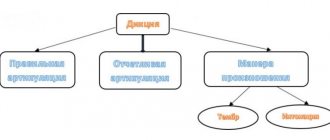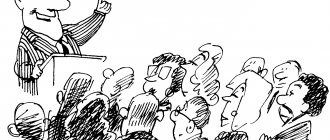Why do you need good diction?
Proper diction implies clear pronunciation of words and correct placement of the speech organs. The reason for poor diction is congenital defects of the speech apparatus. But the reason may also be imitation of the speech of other people in childhood. But even with poor pronunciation, improvement is possible if special diction exercises are used.
The delivered diction helps:
- Achieve understanding. If a person has not worked on speech development, the information he expresses will be difficult to perceive by people who are seeing him for the first time and are not accustomed to the peculiarities of pronunciation.
- Make an impression. Improving your diction helps when you need to show your best side. An example is a conversation with an employer who would be more willing to give a position to a person with clear pronunciation.
- Attract attention. If a person is constantly developing his pronunciation and voice, any story he tells will be more readily accepted than if he has a speech impediment.
Causes of speech problems
Speech impairment is rarely associated with any disease. Many people have difficulty pronouncing hissing sounds, and “l” or “r”. These problems may be caused by a weakened articulation apparatus.
It happens that a person has literate speech and pronounces all the sounds, but at the same time it is impossible to listen to him. Speech is slurred and slurred. The undeveloped articulatory apparatus is also to blame for this. He needs to be trained.
Often the cause of unclear speech is shyness and lack of self-confidence. This is a secondary problem; you need to work on your character.
To win people over you need to show them what you are like. Tell about yourself. But not just in general phrases, but, for example, tell some interesting incident that happened to you. You will immediately notice a change in attitude towards you.
Development of pronunciation in adults
The development of diction in an adult differs in that the production of sounds is much more complex. When a person is accustomed to pronouncing words in a certain way, he has to change not only the pronunciation, but also the perception of his speech. Before improving your diction, it is worth considering the main types of exercises.
To develop their diction and voice, announcers usually use the following exercises:
- pronunciation of tongue twisters;
- listening to your voice;
- breathing training.
To learn beautiful speech using tongue twisters, you should choose several such phrases designed to develop the pronunciation of certain sounds and find out which of them are more difficult to pronounce. It is on them that you should concentrate your attention. It is important to pronounce such phrases regularly so that the speech apparatus gets used to the correct pronunciation. Working on yourself means doing exercises every day.
A tool that helps you learn to pronounce sounds correctly is dictation recordings. If you listen to your speech on a recording, you can understand that it sounds completely different from how it sounds when talking to your interlocutor. When identifying defects and correcting them, you need to constantly record speech until they disappear.
A common problem is shortness of breath when speaking long phrases. This becomes noticeable during public speaking. To get rid of this problem, the diaphragm training method is used. One of the diction exercises is to draw out the vowel sound as you exhale for as long as possible. At first you can only do this for a few seconds, but later the time increases to 25. Breathing training also involves changing the pitch of your voice. Another way to practice is to blow up balloons.
With regular exercise, the results appear within a few days. But to maintain the effect, you need to do all of the above constantly. At the same time, it is worth using books that are intended for speech development.
Breathing exercises
To improve your diction and clarity of speech, you need to learn how to breathe correctly. The following exercises will help with this:
- We stand straight. Feet shoulder width apart. Palms lie on the belt. Inhale freely. We exhale air through pursed lips so that its resistance is felt. This exhalation must be done while moving. Imitate working with a scythe, an axe, cleaning the house with a broom/vacuum cleaner, and similar movements. You need to learn to exhale evenly, without tension (tension should be felt in the lower costal muscles).
- As you inhale, slowly bend forward. The back remains straight. Then we straighten up. We exhale and begin to draw out the word “gimmmm”, while simultaneously walking in place.
- As you inhale, slowly lean forward, spread your arms to the sides, and close them behind your head (at the back of your head). We straighten up as we exhale and chant the sounds “GN”, walking in place.
- Mouth closed. We take a short breath through the nose. While exhaling, tap your fingers along the edges of your nostrils. Exercise improves nasal breathing. Now we add a new element: while exhaling, we make the sounds “M” and “N”.
- The mouth is open. We inhale through the nose. Exhale slowly through your mouth.
- Self-massage. With a little effort we press through the intercostal muscles, then move on to the abdominal area. This helps stimulate local blood circulation.
Text for diction development
To develop correct pronunciation, there are texts that are compiled on the same principle as tongue twisters. They usually combine several tongue twisters to develop different sounds. This means that to correct diction you do not need to search for texts. To practice, just find tongue twisters to make all the sounds and combine them into a single whole.
To help the formation of correct pronunciation occur faster, nuts of different sizes are placed in the mouth or a pencil is clamped between the teeth. After removing such items, you can feel that it has become easier to pronounce even complex phrases.
Expressive reading of fiction also helps to develop diction. By recording your pronunciation on a voice recorder, you can easily determine which sounds are being pronounced incorrectly.
Correct speech of schoolchildren
The formation of clear pronunciation of sounds has its time. During the first 5-6 years of life, this process occurs easily (if there are no speech therapy or neurological problems). After 6 years, making sounds is much more difficult.
Intelligible pronunciation of correct sounds is trained much later - at 6 years of age. Schoolchildren sometimes find it difficult to express their thoughts, answer in front of everyone, or give a speech loudly, since they lack rhetoric skills and have not developed diction. How can you help your child?
Diction training with tongue twisters
At primary and middle school age, children remember rhymes and tongue twisters well. This needs to be used for work. Rules for practicing with tongue twisters:
- You need to teach them no more than three, so that they are aimed at practicing certain sounds.
- The text is pronounced clearly and slowly, and unclear words are explained.
- It is better for a child to practice by seeing himself in the mirror - he better understands how his articulation works.
- The child should be encouraged to pronounce the tongue twister in a singsong voice, with emotion. This is especially effective for schoolchildren who stutter.
After such lessons with correctly selected tongue twisters, children communicate clearly and can be understood.
Factors that prevent you from speaking well
Children today often make stylistic and other mistakes in communication. This indirectly affects their academic performance.
The enemies of beautiful speech for children and youth are:
- Parasitic words are speech garbage that clogs up communication. At the same time, it is difficult to listen and perceive information. The reason for filler words is the inability to form thoughts and a small vocabulary. To solve the problem, maximum communication on various topics is required, focusing on eliminating such words from speech in order to express oneself competently.
- Obscene words - schoolchildren use them especially often. Reason: copying parents, significant adults and peers. Prevention: such words should be excluded from family communication; when used, it is important to explain to the child their uselessness in the conversation of well-mannered people.
- Slang is words that are of no use to schoolchildren. At this age it is difficult to get rid of them, as they emphasize the status of a teenager. But here, confidential communication with parents is also necessary for their complete eradication.
The longest tongue twister
“On Thursday the 4th, at 4 and a quarter o’clock, the Ligurian traffic controller was regulating in Liguria, but 33 ships tacked, tacked, but never caught, and then the protocol about the protocol was recorded by the protocol, as the interviewed Ligurian traffic controller was eloquent, but not reported cleanly, and so reported about the wet weather that, so that the incident did not become a contender for a judicial precedent, the Ligurian traffic controller acclimatized in unconstitutional Constantinople, where the tufted laughter laughed and shouted to the Turk, who was blackly stoned with a pipe: don’t smoke, Turk, a pipe, buy a better one a pile of peaks, it’s better to buy a pile of peaks, otherwise a bombardier from Brandeburg will come and bombard him with bombs because some black-snouted guy dug up half his yard with his snout, dug up and dug up; but in fact the Turk was not in the business, and Klara the King was sneaking to the stall at that time, while Karl was stealing corals from Klara, for which Klara stole the clarinet from Karl, and then in the yard of the tar widow Varvara, 2 of these thieves stole firewood; but it’s a sin - not laughter - not to put it in a nut: about Clara and Karl in the darkness, all the crayfish were noisy in a fight - so the thieves had no time for the bombardier, but also not the tar widow, and not the tar children; but the angry widow put the firewood in the barn: once firewood, 2 firewood, 3 firewood - all the firewood could not fit, and 2 woodcutters, 2 woodcutters, for the emotional Varvara, expelled the firewood across the width of the yard back to the wood yard, where the heron withered, the heron withered, the heron died; the heron's chick clung tenaciously to the chain; well done against the sheep, and against the well done the sheep itself, to which Senya carries the hay in a sleigh, then Senka carries Sonya and Sanka on a sled: the sled hops, Senka sideways, Sonya head on, everything into a snowdrift, and from there only a head of bumps knocked him down, then Sasha went along the highway, Sasha found the sachet on the highway; Sonya - Sashka’s friend was walking along the highway and sucking a dryer, and besides, Sonya the turntable also had 3 cheesecakes in her mouth - exactly like a honey cake, but she had no time for a honey cake - Sonya, with the cheesecakes in her mouth, would over-mix the sexton, - over-mix: it buzzes like ground beetle, buzzing and spinning: was at Frol's - Frol lied about Lavra, will go to Lavra at Frol Lavra will lie that - the sergeant with the sergeant, the captain with the captain, the snake has a snake, the hedgehog has a hedgehog, and a high-ranking guest has taken away from him a cane, and soon again 5 guys ate 5 honey mushrooms and a half-quarter of a quadruple of lentils without a wormhole, and 1666 pies with cottage cheese from whey from yogurt - about all of that, the bells were ringing with groans, so much so that even Konstantin - a Salzburg unpromising man from - under an armored personnel carrier he stated: just as all the bells cannot be re-ringed, all the tongue twisters cannot be repeated, all the tongue twisters cannot be re-spoken; but trying is not torture.”
How to improve your diction in a short time
Sometimes it is not possible to perform exercises to practice pronunciation due to lack of time. In such situations, articulatory charging is used. It consists of several simple exercises:
- Moving the jaw back and forth. During such actions, the mouth is in an open position.
- Pronouncing the vowels o, u and y. This should be done in a bent position with your arms crossed over your chest. At the same time, the voice lowers and the sound is pronounced in a drawn-out manner. After the next sound, you need to rise to a standing position, and then tilt and repeat the action.
- Tongue movements. A good exercise for quickly developing diction is a movement in which the tongue rests alternately on the cheeks. This is done both with a closed and open mouth.
- Touching teeth. This exercise is performed with your mouth wide open. With your tongue you need to touch each tooth in turn, following the top and bottom rows.
After completing such diction exercises, the clarity of spoken phrases increases, so they are often used by people speaking in front of the public.
Games-exercises for the formation of intelligible, clear speech of preschoolers
You can play with babies from the age of one year, when the time comes for imitation. Different methods are used for training, the most common of which are presented below.
Exercises for early childhood
From one to two years of age, the study of sounds in speech begins:
- “ssssss” - let’s repeat over some water how she sings;
- “zh-zh-zhzh” - the beetle is buzzing, let’s buzz along with it;
- “sh-sh-shsh” - say how the wind makes noise;
- “r-r-rr” - that’s how dad’s machine talks, talk like it.
Here you can repeat the sounds of animals, nature, musical instruments and objects that make noise.
Gymnastics for articulation
Kids cannot yet perform complex tasks, so for gymnastics they use the easiest movements:
- Spatula. The baby opens his mouth, the tongue rests on the lower lip, hold for up to 10 s.
- Watch. The child opens his mouth in a smile, with his tongue you need to touch one corner, then the second.
- Elephant. Imitation of an elephant trunk: you need to close the sponges into a tube and stretch them out, keep them stretched out for up to 10 seconds.
- Mustache. You need to fix the stick (straw, pencil) between the nose and the upper lip. Hold for up to 10 s.
After the exercises, you should pay attention to how the child pronounces basic sounds.
Diction training in older preschool age
This period is characterized by the fact that the preschooler quickly learns new material, actively expands his vocabulary, stops lisping and begins to pronounce sounds correctly. To avoid “mess in your mouth,” you need to constantly talk to your child and train diction.
Impaired diction occurs due to the need to quickly change the position of the tongue. And if his muscles are weak, this will be expressed as “porridge in his mouth” during a conversation.
- Warm up lips. With your mouth wide open, pronounce the sound “A”, with your lips extended, “U”. With your lips stretched as far as possible, say “O.”
- Warm up the tongue. Click: reach the tongue to the upper palate, sharply lower the tongue. With your mouth closed, place your tongue on your cheeks one at a time. Reach the tongue to the upper palate, the frenulum should be taut.
- Timbre training. You need to take a deep breath, and as you exhale, slowly say “bom”, “bim”, “bon”. Syllables stretch to the last consonant.
- Facial muscle training. Playing pantomime with parents: the child must show different emotions using facial expressions in a playful way.
Is it worth taking speech development courses?
There are speech development courses designed for speakers. They include not only exercises for correct pronunciation, but also tips to help cope with problems that arise during public speaking. The programs of such courses consist of several lessons:
- rules of articulation;
- learning the basics of proper breathing;
- development of vocal range and strength;
- rules for constructing intonation;
- study of orthoepy;
- mastering the basics of gestures.
The courses help you learn proper pronunciation techniques and overcome the fear of speaking in front of an audience. Working on yourself involves long sessions, which is why announcers do this.
Speech defects arise due to improper structure of the speech apparatus or due to improper formation of sounds in childhood. The first type of defects can only be corrected with the help of speech therapists or dentists, if we are talking about irregular teeth structure.
You can correct your speech by using the normal arrangement of the organs of articulation during a conversation. In the absence of deviations in the development of the body, defects appear:
- sonorous sounds;
- hissing;
- whistling.
The occurrence of such defects occurs as a result of even a slight deviation of the speech organs from their natural location. For correct pronunciation, you need to know how to correctly position the lips, tongue, soft palate and lower jaw. This can only be achieved through training, because working on speech correction implies constant improvement.
Causes of slurred and unclear pronunciation
At the age of 2-5 years, parents often complain about their child’s poor pronunciation. This is due to physiological characteristics when there is insufficient development:
- language;
- soft palate;
- lips;
- lower jaw.
Normally, age-related abnormal sounds disappear by the age of 5 years. If before this age there is no clarity and intelligibility in speech, efforts should be made to form the correct pronunciation. This process requires the help of a specialist and special exercises.
How to fix slurred speech
A common speech defect that manifests itself in people with a normally developed articulatory apparatus is slurring. It manifests itself in swallowing entire syllables during a conversation. Such a defect is formed in childhood due to unconscious imitation of others. To get rid of it, you need to perform the following exercises to improve diction:
- Scan poems, following the rhythm. You should choose works that are more difficult to read. An example is Mayakovsky's poems. This kind of self-improvement will help you quickly correct speech deficiencies.
- Often pronounce words that have consonants next to each other. For example, counter-revolution. After composing such words, you should say them several times a day.
This will help you improve your pronunciation in just a few weeks.
Improving diction in teenagers
Teenagers also need to start working on developing diction after articulation and breathing exercises. Exercises should be aimed at developing the speech apparatus, pronouncing individual sounds, complex words, and sentences. While working, you need to simultaneously monitor your breathing: at the beginning of a sentence, take an imperceptible breath, distribute it over the remaining time until the end of the speech. On the next sentence, repeat the procedure again.
The following suggestions and exercises are suitable for warming up a teenager. These can be tongue twisters, short poems, pure tongue twisters.
Difficult texts for diction must be taken after successfully pronouncing difficult tongue twisters. When reading a text, it is important to maintain clear pronunciation, train correct articulation, gradually increasing the tempo.
When working with teenagers, it is also important to have interesting and unusual material. Due to their age, children may approach activities irresponsibly. Properly selected exercises will distract you and set you in a positive mood. A cheerful Chinese tongue twister works well in this case.
Once upon a time there lived three Chinese - Yak, Yak-Tsidrak, Yak-Tsidrak-Tsidron-Tsidroni, and three more Chinese women - Tsypa, Tsypa-Dripa, Tsypa-Dripa-Lampomponi. Yak got married to Tsypa, Yak-Tsidrak to Tsypa-Dripa, Yak-Tsidrak-Tsidron-Tsidroni to Tsypa-Dripa-Lampomponi... So they had children: Yak and Tsypa - Shah, Yak-Tsidrak and Tsypa-Drypa - Shah -Sharah, at Yak-Tsidrak-Tsidroni with Tsypo-Drypa-Lampoponi - Shah-Sharah-Sharoni.
How to put a voice
There are 3 exercises that help develop your voice. In order for an audible effect to appear, it is necessary to perform the exercises for several months. Such exercises include:
- Pronouncing vowels. To perform the first exercise to develop diction, you need to pronounce vowel sounds one by one until you have enough breath. Saying “i”, “e”, “a”, “o” and “u” can make your voice more sonorous. Work on voice training occurs constantly, since during breaks, even for a few days, the effect becomes less noticeable.
- Activation of the abdominal and chest area. To activate the abdominal and chest areas, you need to pronounce “m” with your mouth closed. The first utterance of the sound should be quiet, the second louder, and the third time you need to strain the vocal cords as much as possible. If work on pronunciation and voice occurs without performing these exercises, the effect is reduced.
- Pronouncing words with the letter "r". Also, to establish the voice, the sound “r” is pronounced, which also improves pronunciation. To do this, you first need to growl the sound “rrrr”, and then pronounce more than a dozen words containing the letter r in a row. During pronunciation, the letter should stand out. This exercise will help you develop your voice and improve your diction. Books also help develop diction when read aloud.
To develop diction and achieve clear pronunciation, you need to work hard.
Only through regular exercise and training will you achieve tangible changes. Previous articlePreviousNext articleNext
We work on the technique and content of speech
Many people make the mistake of talking too quickly. It is difficult for listeners to perceive a chattering person. No one wants to delve into the meaning of what an interlocutor who cannot control the pace of his speech says.
To ensure that the pace of your speech is pleasing to your listeners, you need to work on yourself every day. Start very slowly pronouncing this or that material that does not require any understanding: names of cities or countries, female or male names, numbers from one to one hundred, etc. Record yourself on a voice recorder so that later you will have the opportunity to pronounce words not only in forward order, but also in reverse order.
Try to remember this sequence of words over time. This way you can improve not only the pace of your speech, but also your memory. After this, proceed to repeating the sequence of words by ear. Text that should be written at a fast pace should be repeated very slowly.











